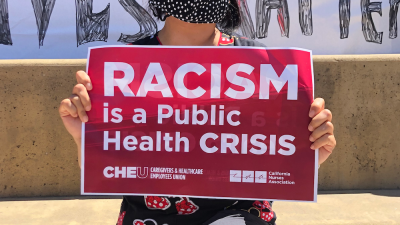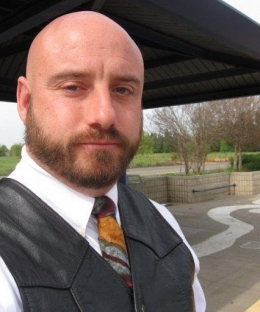 By David R. Shorey, East County Program Manager, Institute for Public Strategies
By David R. Shorey, East County Program Manager, Institute for Public Strategies
March 31, 2021 (San Diego) -- When it comes to adverse mental health conditions related to COVID-19, younger adults, racial and ethnic minorities, essential workers and unpaid adult caregivers report having more increased substance use and mental health issues than others who are not listed in those categories.
That’s according to the Morbidity and Mortality Weekly Report (MMWR) that was issued by the Centers for Disease Control and Prevention (CDC) over the summer. In San Diego County, according to reports by the San Diego Association of Governments, approximately half of Black (52%) and Latinx (49%) residents live in ZIP codes with higher than average COVID-19 cases. The CDC suggests that the public health response to the pandemic should prioritize people of color with increased intervention and prevention.
 At the Institute for Public Strategies, we couldn’t agree more. Equity should be the focus, front and center, in the public health arena and for the prevention and treatment of substance use disorders.
At the Institute for Public Strategies, we couldn’t agree more. Equity should be the focus, front and center, in the public health arena and for the prevention and treatment of substance use disorders.
Studies have shown a correlation to experiences of racism and substance abuse by Indigenous, Black, Hispanic and other non-white ethnic groups (BIPOC). It has been shown that diverse communities are more frequently targeted and seen as dumping grounds by alcohol retailers than White communities. In ethnically diverse Spring Valley, and throughout East County, IPS has been working with community members to address over-concentration of alcohol retailers and illegally operating marijuana dispensaries. The City of Santee and community members including IPS, worked to identify and implement specific steps to raise awareness of and promote Diversity, Equity, and Inclusions in the city. Hopefully, other cities will take their lead, roll up their sleeves and do the same.
The trend from the CDC’s summer survey continued until February when the Kaiser Family Foundation issued a brief that showed the pandemic has disproportionately affected the health of communities of color. Black adults reported symptoms of anxiety or depressive disorder at a rate of 48%, while 46% of Latinx adults reported the same symptoms. Historically, the brief reported, these communities of color have faced challenges accessing mental health care.
 The Journal of the American Medical Association (JAMA) found similar results in an online survey that showed an increase in mental health issues, substance use and adults who reported thinking about, considering or planning suicide since before the pandemic.
The Journal of the American Medical Association (JAMA) found similar results in an online survey that showed an increase in mental health issues, substance use and adults who reported thinking about, considering or planning suicide since before the pandemic.
The U.S. Census Bureau’s Household Pulse Survey is an ongoing, continuous measurement of how the pandemic is impacting our lives to present day. The survey began in April 2020, shortly after the pandemic did, teaming up with the National Center for Health Statistics. Respondents have been consistently reporting difficulty sleeping, more substance use, more depression and more anxiety. Young adults in the 18-24 age range are impacted most. The situation gets worse for people who have experienced the loss of their job; lower income earners; families with young children; those who suffer from social disparities like marginalized groups and communities of color; and essential workers. The pandemic will have a long term negative impact on all of us, especially BIPOC communities.
Statistics regarding San Diego County populations echo the results in the national surveys, and show a greater impact by COVID-19 on areas with higher unemployment and also where there are greater populations of Black and Latinx community members. Spring Valley, El Cajon and areas along Interstate 8 east of there have greater amounts of COVID-19 infection. These areas also tend to have higher concentrations of BIPOC community members.
So now that we can all agree there is a problem when it comes to health equity, it’s time to start defining solutions. The Substance Abuse and Mental Health Services Administration (SAMHSA) is part of the U.S. Department of Health and Human Services Administration. SAMSHA defines behavioral health equity as the right to access quality health care for all populations regardless of the individual’s race, ethnicity, gender, socioeconomic status, sexual orientation or geographical location. This includes access to prevention, treatment, and recovery services for mental and substance use disorders.
While we’re at it, let’s commit to fair and just practices across all sectors of society. That means education, housing, transportation, community development, commerce, finance and other sectors must be involved in efforts for health equity, and that our definition should acknowledge explicitly that health equity requires efforts beyond the health care sector. We should be able to measure our progress, because without measurement there is no accountability. We should be respectful of the groups of particular concern, not only defining the challenges they face but also affirming their strengths.
Through our County of San Diego contracted substance use program, IPS has focused our work in East County on address systemic issues that create an environment conducive to substance abuse in communities. Issues like over-concentration of adult oriented businesses (alcohol retailers, cannabis dispensaries, massage parlors, hookah lounges, vape stores), lack of access to healthy food, and limited park space or walkable areas create inequitable community conditions. Studies have shown that inequitable conditions contribute to toxic stress responses which have a significant impact on decisions to uses drugs and alcohol. This is especially impactful for youth where toxic stress and Adverse Childhood Experiences (ACES) can play a significant role in development and outcomes later in life.
According to an article by the Center for American Progress, “toxic stress hijacks the body’s immune and endocrine systems and is damaging for a child’s developing brain. It can affect attention, memory, planning, future stress responses, and the ability to learn new skills. It can leave a child with an impaired ability to deal with powerful or negative emotions, leading to behavioral problems in school, possible self-harm, and substance abuse problems in adolescence.”
The San Diego County Board of Supervisors in January approved a resolution declaring racism a public health crisis, vowing to create a County Racial Equity Action Plan. The Board also established the Office of Equity and Racial justice last year and revived the San Diego County Leon L. Williams Human Relations Commission. These are steps in the right direction. Let’s keep the momentum going.
Information and resources for mental health conditions and substance use disorder are available by calling the Access and Crisis Line at (888) 724-7240. The National Association for Mental Illness San Diego Chapter has a downloadable app called oscER (Organized Support Companion in an Emergency Situation) that provides guidance and resources for navigating mental health issues. If you or some you know is experiencing a mental health or medical emergency, call 911.
IPS works alongside communities to build power, challenge systems of inequity, protect health and improve quality of life. To find out more and learn about efforts underway in your community to promote equity and improve community conditions, follow us at https://www.facebook.com/IPSEastCounty or by clicking on the links to our social media platforms: IPS East County Facebook, IPS East County Twitter, East County Youth Coalition Instagram.












Recent comments